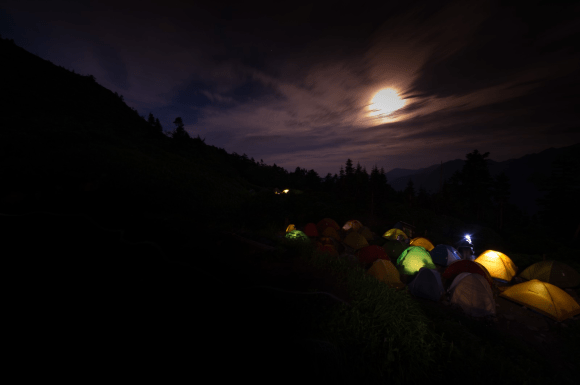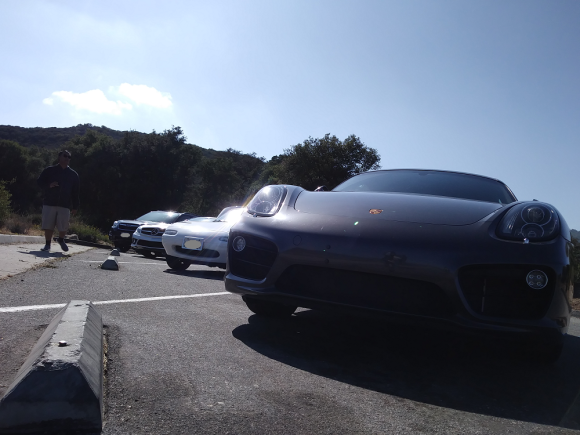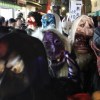
Why Does Engrish Happen? is back with a look at what seems to be where Sailor Moon would park her car.
Engrish, poorly translated Japanese-to-English text, is a consistent source of amusement for English-speaking foreign residents and travelers in Japan. Sometimes, though, Engrish is so bombastically off the mark that even native Japanese citizens can’t help chuckling.
Twitter user @BLINK1_16 was recently walking through a station at an undisclosed location somewhere in Japan. Mixed in with mundane signage pointing out directions to specific tracks or exits was nothing less than a call to destiny.
https://twitter.com/BLINK1_16/status/1001372768191959040“The moon ultra parking is being recruited,” read the proclamation, an announcement of significance seemingly far beyond its understated English font. But while Japan may be the birthplace of Sailor Moon, parking lots here don’t double as sign-up spots for magical girl teams, so what’s really going on with this sign?
Written above the Engrish is:
Right off the bat we’ve got 月, pronounced tsuki by itself, which does, indeed, mean “moon.” And right after that we’ve got 極, kyoku, which means “extreme,” so “ultra” isn’t an entirely off-base English rendering either.
However, in Japanese 月 can also be used to mean “month” (because there’s one full moon per month, which is also why the English words “moon” and “month” sound so similar). Likewise, 極 can also mean “pole” (as in 北極/hokkyoku, “North Pole”), implying the furthermost position or condition, and, by extension, a limit or ending.
So when you put 月 and 極 together, they become tsukigime, effectively meaning “limited at the month,” or, to phrase it more naturally, “monthly.”
With that cleared up, the rest of the real meaning for 月極駐車募集中, which is pronounced tsukigime chuusha boshuu chuu, falls into place pretty easily. 駐車/chuusha means “parking,” 募集/boshuu means “recruiting,” and 中/chuu, in this usage, means “currently.” Put it all together, and, literally, we’ve got “Currently recruiting for monthly parking,” and a final bit of polish to make that sound more natural in English would result in “Applications now being accepted for monthly parking spaces.”
▼ Granted, if the parking spaces are outside, and you’ve got a cool car, you could still argue that it’s “moon ultra parking” once the sun goes down.
As usual with Engrish, the cause of the problem seems to be a blind reliance on automated translation, as one commenter found that plugging 月極駐車募集中 into Japanese Internet portal Excite’s Japanese-to-English translator spits back, word for word, what @BLINK1_16 saw on the sign.
https://twitter.com/DropkickRene/status/1002822729739849729But, as is also often the case, the station still deserves a bit of credit for the attempt. It wasn’t so long ago that most public signage in Japan didn’t even try to provide non-Japanese notifications, and even if this one failed to convey its message, it still provided a few laughs, and at least this time no one got in trouble with the law.
Source: Twitter/@BLINK1_16 via Hachima Kiko
Top image: Pakutaso
Insert images ©SoraNews24
Follow Casey on Twitter, where he makes no secret of his love of linguistics and cars.



 McDonald’s Japan releases new “Ultra” prawn and macaroni croquette burger
McDonald’s Japan releases new “Ultra” prawn and macaroni croquette burger Engrish sign at the Tokyo Olympics turns out to be hilariously accurate
Engrish sign at the Tokyo Olympics turns out to be hilariously accurate Foreigner accused of shoplifting tea in Japan, label to blame 【Why Does Engrish Happen in Japan?】
Foreigner accused of shoplifting tea in Japan, label to blame 【Why Does Engrish Happen in Japan?】 This squirrel is sub-par! More nonsense Japanese hits the fashion market
This squirrel is sub-par! More nonsense Japanese hits the fashion market Sailor Moon girls appear as samurai and ninja in five-piece character art collection
Sailor Moon girls appear as samurai and ninja in five-piece character art collection McDonald’s new Happy Meals offer up cute and practical Sanrio lifestyle goods
McDonald’s new Happy Meals offer up cute and practical Sanrio lifestyle goods All-you-can-drink Starbucks and amazing views part of Tokyo’s new 170 meter-high sky lounge
All-you-can-drink Starbucks and amazing views part of Tokyo’s new 170 meter-high sky lounge Super Nintendo World expansion gets delayed for several months at Universal Studios Japan
Super Nintendo World expansion gets delayed for several months at Universal Studios Japan Kyoto’s 100 Demons yokai monster parade returns!
Kyoto’s 100 Demons yokai monster parade returns! Beautiful Sailor Moon manhole cover coasters being given out for free by Tokyo tourist center
Beautiful Sailor Moon manhole cover coasters being given out for free by Tokyo tourist center Studio Ghibli glasses cases let anime characters keep an eye on your spectacles
Studio Ghibli glasses cases let anime characters keep an eye on your spectacles McDonald’s Japan releases a pancake pie for new retro kissaten coffeeshop series
McDonald’s Japan releases a pancake pie for new retro kissaten coffeeshop series Hamster abandoned at Tokyo ramen restaurant gets new home
Hamster abandoned at Tokyo ramen restaurant gets new home A Japanese vending machine perfect for samurai
A Japanese vending machine perfect for samurai Does the virgin-killing sweater really kill virgins?【Video】
Does the virgin-killing sweater really kill virgins?【Video】 Disney princesses get official manga makeovers for Manga Princess Cafe opening in Tokyo
Disney princesses get official manga makeovers for Manga Princess Cafe opening in Tokyo More foreign tourists than ever before in history visited Japan last month
More foreign tourists than ever before in history visited Japan last month Starbucks reopens at Shibuya Scramble Crossing with new look and design concept
Starbucks reopens at Shibuya Scramble Crossing with new look and design concept Beautiful new Final Fantasy T-shirt collection on the way from Uniqlo【Photos】
Beautiful new Final Fantasy T-shirt collection on the way from Uniqlo【Photos】 Is the new Shinkansen Train Desk ticket worth it?
Is the new Shinkansen Train Desk ticket worth it? Foreign English teachers in Japan pick their favorite Japanese-language phrases【Survey】
Foreign English teachers in Japan pick their favorite Japanese-language phrases【Survey】 Japanese convenience store packs a whole bento into an onigiri rice ball
Japanese convenience store packs a whole bento into an onigiri rice ball We try out “Chan Ramen”, an underground type of ramen popular in the ramen community
We try out “Chan Ramen”, an underground type of ramen popular in the ramen community Studio Ghibli releases Kiki’s Delivery Service chocolate cake pouches in Japan
Studio Ghibli releases Kiki’s Delivery Service chocolate cake pouches in Japan Japan’s bone-breaking and record-breaking roller coaster is permanently shutting down
Japan’s bone-breaking and record-breaking roller coaster is permanently shutting down New definition of “Japanese whiskey” goes into effect to prevent fakes from fooling overseas buyers
New definition of “Japanese whiskey” goes into effect to prevent fakes from fooling overseas buyers Our Japanese reporter visits Costco in the U.S., finds super American and very Japanese things
Our Japanese reporter visits Costco in the U.S., finds super American and very Japanese things Studio Ghibli unveils Mother’s Day gift set that captures the love in My Neighbour Totoro
Studio Ghibli unveils Mother’s Day gift set that captures the love in My Neighbour Totoro Foreign passenger shoves conductor on one of the last full runs for Japan’s Thunderbird train
Foreign passenger shoves conductor on one of the last full runs for Japan’s Thunderbird train Domino’s Japan now sells…pizza ears?
Domino’s Japan now sells…pizza ears? New Japanese KitKat flavour stars Sanrio characters, including Hello Kitty
New Japanese KitKat flavour stars Sanrio characters, including Hello Kitty Kyoto creates new for-tourist buses to address overtourism with higher prices, faster rides
Kyoto creates new for-tourist buses to address overtourism with higher prices, faster rides Sales of Japan’s most convenient train ticket/shopping payment cards suspended indefinitely
Sales of Japan’s most convenient train ticket/shopping payment cards suspended indefinitely Sold-out Studio Ghibli desktop humidifiers are back so Totoro can help you through the dry season
Sold-out Studio Ghibli desktop humidifiers are back so Totoro can help you through the dry season Japanese government to make first change to romanization spelling rules since the 1950s
Japanese government to make first change to romanization spelling rules since the 1950s Ghibli founders Toshio Suzuki and Hayao Miyazaki contribute to Japanese whisky Totoro label design
Ghibli founders Toshio Suzuki and Hayao Miyazaki contribute to Japanese whisky Totoro label design Doraemon found buried at sea as scene from 1993 anime becomes real life【Photos】
Doraemon found buried at sea as scene from 1993 anime becomes real life【Photos】 Tokyo’s most famous Starbucks is closed
Tokyo’s most famous Starbucks is closed One Piece characters’ nationalities revealed, but fans have mixed opinions
One Piece characters’ nationalities revealed, but fans have mixed opinions We asked a Uniqlo employee what four things we should buy and their suggestions didn’t disappoint
We asked a Uniqlo employee what four things we should buy and their suggestions didn’t disappoint Princesses, fruits, and blacksmiths: Study reveals the 30 most unusual family names in Japan
Princesses, fruits, and blacksmiths: Study reveals the 30 most unusual family names in Japan Tokyo shop makes ramen for foreigners by adding sugar, something called “Japanese sprit!!”
Tokyo shop makes ramen for foreigners by adding sugar, something called “Japanese sprit!!” In the name of the moon, Sailor Moon feminine pads will absorb your menstrual flow!
In the name of the moon, Sailor Moon feminine pads will absorb your menstrual flow! New Pokémon games coming to Nintendo Switch and 3DS this fall!【Videos】
New Pokémon games coming to Nintendo Switch and 3DS this fall!【Videos】 Sailor Moon team is ready to keep your legs warm, nose dry with tights and tissue holders
Sailor Moon team is ready to keep your legs warm, nose dry with tights and tissue holders Learn how to drink with Japanese people in this funny and informative YouTube series【Videos】
Learn how to drink with Japanese people in this funny and informative YouTube series【Videos】 English mistake makes Kyoto the enemy of the world
English mistake makes Kyoto the enemy of the world Sailor Moon birthday cakes come with chocolate Senshi, are fun for kids from 1 to 987,654,322,110
Sailor Moon birthday cakes come with chocolate Senshi, are fun for kids from 1 to 987,654,322,110 Sailor Moon tenugui towels are a handy and elegant crossover of anime of tradition
Sailor Moon tenugui towels are a handy and elegant crossover of anime of tradition Sailor Moon’s mentor cat Luna transforms into bread, looks adorable and delicious
Sailor Moon’s mentor cat Luna transforms into bread, looks adorable and delicious The Sailor Moon item that will officially turn you into a candidate for Hoarders!
The Sailor Moon item that will officially turn you into a candidate for Hoarders! Sailor Moon tribute art show now on in California — come join the masquerade this weekend!
Sailor Moon tribute art show now on in California — come join the masquerade this weekend! Piko Taro stops by Sesame Street to help Elmo and Cookie Monster with their version of PPAP【Vid】
Piko Taro stops by Sesame Street to help Elmo and Cookie Monster with their version of PPAP【Vid】 Sailor Moon Crystal menu at Namja Town features adorable drinks, meals and desserts
Sailor Moon Crystal menu at Namja Town features adorable drinks, meals and desserts Decorate your whole house like Sailor Moon’s Moon Castle with the new Isetan collaboration
Decorate your whole house like Sailor Moon’s Moon Castle with the new Isetan collaboration Free Sailor Moon condoms to be given out by Japanese government
Free Sailor Moon condoms to be given out by Japanese government Brand-new line of Sailor Moon bikinis appears, has anime fans in Japan looking forward to summer
Brand-new line of Sailor Moon bikinis appears, has anime fans in Japan looking forward to summer
Leave a Reply